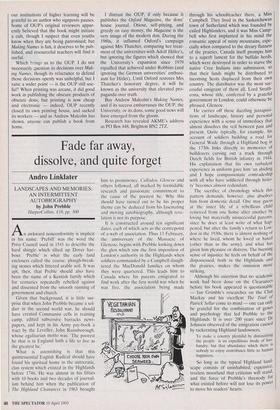Fade far away, dissolve, and quite forget
Andro Linklater
LANDSCAPES AND MEMORIES: AN INTERMITTENT AUTOBIOGRAPHY by John Prebble
HarperCollins, £18, pp. 300
An awkward nonconformity is implicit in his name. 'Prebill' was the word the Privy Council used in 1541 to describe the hard shingle which silted up Dover har- bour. 'Preble' is what the early land enclosers called the coarse, plough-break- ing stones which littered arable soil. It was apt, then, that Preble should also have been the name of a Kentish family which for centuries repeatedly rebelled against and dissented from the smooth running of government and church.
Given that background, it is little sur- prise that when John Prebble became a sol- dier in the second world war, he should have created Communist cells in training camp, edited subversive barracks news- papers, and kept in his Army pay-book a tract by the Leveller, John Rainsborough, whose egalitarian motto was: 'The poorest he that is in England hath a life to live as the greatest he.'
What is astonishing is that this quintessential English Radical should have found his spiritual home in the autocratic, clan system which existed in the Highlands before 1746. He was almost in his fifties with 10 books and two decades of journal- ism behind him when the publication of The Highland Clearances in 1963 brought him to prominence. Culloden, Glencoe and others followed, all marked by formidable research and passionate commitment to the cause of the poorest he. Why this should have turned out to be his proper theme can be deduced from his fascinating and moving autobiography, although reve- lation is not its purpose.
It is constructed around ten significant dates, each of which acts as the centrepoint of a web of association. Thus 13 February, the anniversary of the Massacre of Glencoe, begins with Prebble looking down the glen which saw the first imposition of London's authority in the Highlands when soldiers commanded by a Campbell slaugh- tered the MacDonald families on whom they were quartered. This leads him to Canada where his parents emigrated to find Work after the first world war when he was five, the association being made through his schoolteacher there, a Miss Campbell. They lived in the Saskatchewan town of Sutherland which was founded by exiled Highlanders, and it was Miss Camp- bell who first implanted in his mind the romantic appeal of misty mountains, espe- cially when compared to the dreary flatness of the prairies. Canada itself prompts him to a superb lament for the buffalo herds, which were destroyed in order to starve the native Cree Indians into submission, so that their lands might be distributed to incoming Scots displaced from their own country. The distributor was the most suc- cessful emigrant of them all, Lord Strath- cona, whose title, conferred by a grateful government in London, could otherwise be phrased, Glencoe.
He carries off these dazzling juxtaposi- tions of landscape, history and personal experience with a sense of immediacy that almost dissolves the veil between past and present. Quite typically, for example, his account of soldiers building a road for General Wade through a Highland bog in the 1730s links directly to memories of bulldozers carving out a track through Dutch fields for British infantry in 1944. His explanation that his own turbulent experience in uniform gave him 'an abiding and I hope compassionate comradeship with all who have soldiered through histo- ry' becomes almost redundant.
The sacrifice of chronology which this pattern demands, however, also absolves him from domestic detail. One may guess at the inner life of a rebellious child removed from one home after another bY loving but materially unsuccessful parents, since he does at least write of what hap- pened, but after the family's return to Lon- don in the I 930s, there is almost nothing of where he lived, whom he loved or hated (other than in the army), and what has given him pleasure or distress. The burning sense of injustice he feels on behalf of the dispossessed, both in the Highlands and the prairies, makes the omission more striking. Although his assertion that no academic work had been done on the Clearances before his book appeared is questionable — Ian Grimble's researches on the Clan Mackay and his excellent TO Trial of Patrick Seliar come to mind — one can only be grateful for the combination of genes and psychology that led Prebble to the Highlands. It is over 200 years since Dr Johnson observed of the emigration caused by rackrenting Highland landowners, - To make a country plentiful by diminishing the people is an expeditious mode of hus- bandry, but that abundance which there is nobody to enjoy contributes little to human happiness.
So long as the typical Highland land- scape consists of uninhabited, expensive, treeless moorland that criticism will stand, and the force of Prebble's threnody for what existed before will not lose its power to move his readers' hearts.


























































 Previous page
Previous page